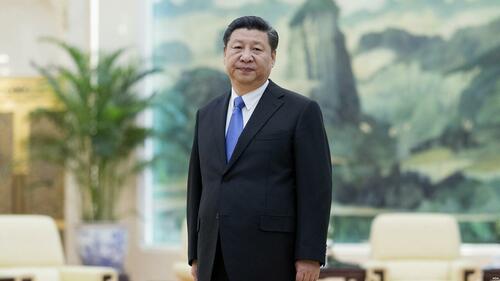APEC Leaders Can’t Ignore Xi’s Widening Uyghur Genocide
Authored by Omar Kanat via RealClear Wire,
Xi Jinping’s visit to Ürümchi, the capital of the Uyghur region, in August has sent a chill through the human rights and Uyghur diaspora communities. During his trip, Xi called on local officials to preserve “hard won social stability” and enhance measures to manage “illegal religious activities.” Xi personally put in place the policies for ongoing crimes against humanity and genocide in East Turkistan, premised on combatting “religious extremism.” And now he is saying that the ongoing repression targeting Uyghurs isn’t harsh enough. This ominous declaration should be seen as a dire warning, signaling darker days ahead for the Uyghur population.
Xi is slated to visit San Francisco in November for the Asia-Pacific Economic Cooperation Forum Leaders Summit. When he meets with the leaders of the 21 APEC economies, which account for nearly 40% of the global population and nearly 50% of global trade, his public declaration that China will deepen its current Xinjiang policies cannot go unchallenged.
Since 2016, the world has witnessed the systematic persecution of Uyghurs in East Turkistan. Reports of mass detentions, forced labor, cultural suppression, and genocidal birth control policies have cast an even longer shadow over China’s human rights record. Despite mounting evidence, the international response has been disturbingly inadequate.
Xi Jinping’s remarks in Ürümchi should serve as a wake-up call: The policies of total surveillance, total assimilation, and universal placement in government jobs are ongoing. Nobody should be taken in by external propaganda purporting to show that everything is normal, saying journalists and tourists are welcome in “Beautiful Xinjiang.” The happy, dancing Uyghurs in the “I’m from Xinjiang” videos in 2023 were preceded by the “new Uyghurs” in the 2021 “Amazing Xinjiang” campaign. But when AFP News tried to inquire about the families of overseas Uyghurs during a recent reporting trip, they were warned away by dozens of plainclothes security officers, toting shovels and hoes.
Visits to the Uyghur region by genocide enablers, such as the Organisation of Islamic Cooperation and the Arab League, should not surprise anyone. However, it is the turn toward engagement with China from staunch supporters of Uyghur rights like the United States and the United Kingdom that is alarming. As the shock of revelations about internment camps and forced labor has waned, sanctions and condemnations have petered out. Bilateral diplomacy has shifted towards improving “lines of communication” with China.
The shift toward engagement plays right into the hands of the Chinese government, which prefers to operate with its dialogue partners turning a blind eye to its human rights abuses. Even more effective is China’s leveraging of its economic largesse and political power to divide any unified response that would exert meaningful pressure on Beijing.
Moreover, the United Nations, including the Office of the United Nations High Commissioner for Human Rights, have been glacially slow to take meaningful action. Despite mounting evidence and OHCHR’s own findings of China’s human rights crimes in the Uyghur region, these bodies have been unable to enact diplomatic protest, let alone bring those responsible to justice.
Indeed, I argue that inaction is normalizing genocide. To address this retrenchment in world attention, the international community must take immediate and coordinated action. This includes:
- Increased sanctions: Countries should expand and strengthen sanctions against Chinese officials and entities involved in the Uyghur genocide. This not only holds individuals accountable but also sends a clear message to Beijing.
- Mobilization of international human rights mechanisms: UN High Commissioner’s Office needs to act on its 2022 report on “interlocking patterns of severe and undue restrictions on a wide range of human rights.” For Uyghurs and other Turkic peoples, a critical window is closing on turning the findings into multilateral pressure on China.
- Pressure on corporations: Companies that benefit from forced Uyghur labor or operate in East Turkistan should face scrutiny and pressure to ensure they are not complicit in crimes against humanity.
- Cessation of trade in Uyghur forced labor goods: China’s massive program of state-imposed forced labor for Uyghurs, an integral component of the ongoing genocide, must be addressed in every trade forum, including the APEC Leaders’ Summit in San Francisco in November.
Xi Jinping’s ominous words in Ürümchi serve as a stark reminder that the Uyghur crisis is far from over. When Xi travels to San Francisco on November 12 for the APEC Summit, APEC leaders must address the elephant in the room. Economic “cooperation” is morally bankrupt if it does nothing to stop genocidal forced labor products in global trade.
The international community must rise to the occasion and act to end economic complicity and moral complacency. Failure to do so will only embolden the Chinese government and ensure that the Uyghur people continue to suffer in silence. The time for action on genocide is always now.
Omer Kanat is executive director of the Uyghur Human Rights Project.
Tyler Durden
Sat, 10/21/2023 – 17:30 Source
 RSS Feed
RSS Feed















 October 22nd, 2023
October 22nd, 2023  Awake Goy
Awake Goy 
 Posted in
Posted in  Tags:
Tags: 













